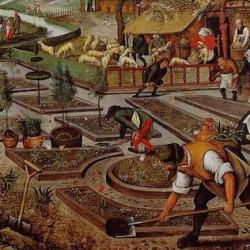“There is a fundamental difference,” John Milbank writes (Future of Love), “between the Biblical and the Greek attitude to labor. The latter supposes that the gods have hidden from human beings the sources of abundant provision, and that these must be sought out by cunning, Promethean labor.” The aim is to “disguise this labor and enjoy its fruits, which alone give it point.” Aristotle brings this Greek attitude toward labor and leisure into the Christian tradition, which flourishes among Thomists like Joseph Pieper (100).
The biblical portrait is radically different. God Himself is the first manual laborer, planting a garden and then pottering together an adam from the adamah to place in the garden (Genesis 2). Before any serpent shows his fangs, Adam is told to “fill, subdue, and rule” the earth, and to “guard and serve” the garden. Whatever else this might mean, it must involve manual labor. Adam is a tiller of the ground, and he is such as the image of the God who tilled the ground before Adam took his first breath.
As Milbank summarizes it: “Labor is not the consequence of the fall, only the debasement of labor. God himself is fundamentally and primordially a worker, and our work is pleasureable because it is the creative tending of God’s universe.” Work is not the unfortunate prelude to the real stuff of living—leisure and contemplation—but is “an end in itself, although it is not the end” (101). Adam images God in his labor because “specifically human work is the gratuitous production of that which is precisely not necessary, namely the difference between nature and culture. All economic necessities ultimately arise within the economic system.” From this, we can infer that “there are really almost no jobs which are automatically routine and laborious; these qualities follow almost entirely from the social context of work, the degree to which we allow it to be performed skillfully, and to be endowed with ritual meaning” (101).
Work isn’t simply the production of necessities. It isn’t something we “do” with no implications for who we are. There is a right instinct in the tendency to identify oneself as electrician, teacher, engineer, business owner, or financial advisor. It’s through our work that we are realized as human beings, as the particular individual humans we are.
Benedictines captured this “transvaluation” of the value of work by uniting “theoria with productive work—both being caught up in liturgy, the opus dei.” One implication, Milbank argues, is that Christianity inverts the usual hierarchy of serious and trivial: For Christians “work is always a form of play (as Creation is for God) whereas so called ‘spare-time’ is the serious time of redemption, of our relation to others and to God” (101).
For Christianity, relations and production aren’t separable: “The context of social relationships limits, guides, and makes meaningful our creative work. Production—whether of food, bridges, words, or computers—extends the possible range of human relationships, and also tends to circumscribe their possible quality” (102). This further breaks down the dualism of labor and leisure. This integration of social relation and labor works only when meaningful work is validated and work seen as “integral to the nature of humanity” (102). Milbank’s vision also expands the scope of labor. Automation may well be a good, since it can take over some tasks. And, “machines do not, strictly speaking, ‘take away from human labor,’ because the sphere of possible human labor is as infinite as human personal needs and the desire for experience and understanding” (102).











